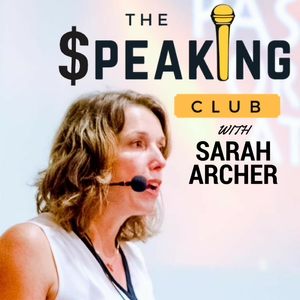
123: Paper Towel Parenting
10/20/21 • 16 min
Previous Episode

122: Lasagna Love
This week I wanted to share a story about food — because, like, who doesn’t love food? This is also the story of a mutual aid effort I’m getting involved in. This program is called Lasagna Love, it’s now extended to all 50 states in the USA, and my family and I are enjoying this opportunity to spread random acts of kindness in the form of food. Lasagna Love matches people who need food with people willing and able to make lasagna. Lasagna Love provides the recipe; a donor makes and delivers the lasagna to the person or people in need. And this isn’t always a financial need, either. Maybe the recipient recently had a baby or has a bunch of kids and is struggling to set the house in order. And sometimes maybe a recipient doesn’t technically even “need” my lasagna, and that’s okay too. The beauty and perhaps the point of volunteering with Lasagna Love is not that I get to be the arbiter of Who Deserves To Have Food, but that I am able to spread joy to anybody who chooses to receive it. Knowing that I have made the world a little better is a reward in itself. This program is also a low-stakes commitment, because you can make and deliver as many or as few lasagnas as you can handle. Once every three months? Perfect. Twice a week? Also perfect. If you’re looking for some way to teach your children about random acts of kindness, I definitely recommend volunteering with Lasagna Love. Visit https://lasagnalove.org/ to learn more about the Lasagna Love mission. Subscribe on Apple! Subscribe on Android! Join my FREE parenting bootcamp! Let’s Connect! Here’s where you can find me: Learn more at https://www.coachingkelly.com. Find me on Instagram! Find me on Facebook!
Next Episode

124: Pepsi Parenting
How do we respond when our emotions feel like they’re going to explode out, just like a shaken soda can? As adults, we have rough days all the time. Emotions run high; we feel out-of-control. We want to scream or cry or throw things, and we have decades of experience being human! That means that we (usually) have tools to monitor and regulate our own emotions. Small children have no such safeguards! When kids have big or tricky emotions, it is their first time experiencing them! As adults, in parenting or teaching capacities, our responsibility is to help our children navigate their new and frightening experience of feeling very big emotions. I’ve learned, from my years as a counselor and teacher, that role-playing and other interactive demonstrations serve well for teaching. Role-plays are best suited for times when your child is at their normal calm state rather than when they’re in the “red” zone (see episode 89, Red Light Green Light). You can help your child visualize buildup of tricky emotions with this demonstration, then remind them about it in a fun way to help them diffuse when the pressure builds later on. Shake a soda bottle up as you explain to your child that big emotions can build until they explode, then open that soda right up and let the pressurized soda explode out. It’s fun, it’s kooky, they’ll probably laugh at it if they’re small. I’ve titled this episode Pepsi Parenting because as you know I love alliteration — but any kind of soda or carbonated beverage will do. Coke, La Croix, you name it. Later on, if you notice your child approaching the “red” zone, you can avoid demanding that they “calm down” or “grow up.” If either of those worked, I would do them on my own kids, but they don’t! Instead, try mentioning, “hey, are you feeling like a shaken-up Pepsi can there?” to keep the atmosphere at a quality I like to call “light and fluffy.” Note that this doesn’t mean we steer away from the serious. We can have honest communication about hard things like tricky emotions, but the dialogue doesn’t have to be serious. Humans, like other mammals, naturally learn by play. As you practice modeling healthy responses to big emotions, your children will continue to learn and grow. Don’t give up; consistency is the key to their learning experience, and yours as well. You’ve got this! Subscribe on Apple! Subscribe on Android! Join my FREE parenting bootcamp! Let’s Connect! Here’s where you can find me: Learn more at https://www.coachingkelly.com. Find me on Instagram! Find me on Facebook!
If you like this episode you’ll love
Episode Comments
Generate a badge
Get a badge for your website that links back to this episode
<a href="https://goodpods.com/podcasts/harmony-in-the-home-138199/123-paper-towel-parenting-17188924"> <img src="https://storage.googleapis.com/goodpods-images-bucket/badges/generic-badge-1.svg" alt="listen to 123: paper towel parenting on goodpods" style="width: 225px" /> </a>
Copy




